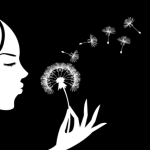
“Whenever something negative happens to you, there is a deep lesson concealed within it.” ~Eckhart Tolle
The most common conversation I have with other people includes the blame game.
The one where your job, your wife, your dog, your mother-in-law, your neighbor six doors down, the media, the government, the receptionist at your doctor’s office, or the dressmaker who measured you wrong is somehow responsible for the problems you’re having.
I too played the blame game.
I intentionally left a marriage that I was very unhappy in and then blamed him for everything. My finances, my unhappiness, my fluctuating weight, my broken-down car, and even my bad hair day were all entirely his fault.
It was then I had that an “aha” moment. I sat there thinking about the blame game wondering, “If games are supposed to be fun, then why is this one keeping me in such a bad place?”
Right then, I made the conscious decision—just like I had left my marriage—that I was going to leave this game behind, too.
I sat down, took a long deep breath, and thought about the ways I’d contributed to my own unhappiness. Once I came up with one way, countless others seemed to follow.
In that moment, I realized I was blatantly ignoring vital life lessons. It wasn’t just my ex’s fault; it was my fault, too.
I believe we are here to learn lessons. Once we learn a lesson we move on to the next one. However, if we fail to learn a lesson, we keep finding opportunities to learn it again and again.
Isn’t it weird that the woman who can’t leave her old unhappy relationship without starting a new one is always in an unhappy relationship? Or the man who quits his job because he can’t stand his overbearing and ungrateful boss lands a new job with a boss who seems even more overbearing and ungrateful?
Life will continue to throw us the same lessons until we learn from them. Here are some ways to start learning that lesson you may be resisting.
1. Believe there is a lesson to be learned and consent to learn it.
This is probably one of the most important steps. Unless you’re really willing to learn the lesson, even if it feels uncomfortable at times, you can never move forward. Consent to view the situation as something that can help you grow.
2. Admit that you might have helped create the problem.
Warning: This does require you to immediately quit playing the blame game! Just consider the possibility that you somehow contributed to your current situation. This doesn’t mean no one else played a part; it just means perhaps you did, as well.
3. Take some alone time and review the situation.
I’m sure you’ve done this multiple times. It’s time to do it differently. Try to view the situation from a different perspective. Get objective and see it from someone else’s eyes. Is there another way to interpret what happened and how it all played out?
This requires you to be really honest with yourself about your choices and actions. If you’re willing to change your perspective you may immediately see what lesson needs to be learned and exactly how to learn the lesson.
4. Let go of your attachment to the problem.
Trying to control the problem—your boss, your spouse, or your circumstances—will only keep you more attached to it. The more you “leech” onto a problem, the more it “leeches” right back on you.
You will never be able to see the lesson or the solution if you dwell on all the little details about what seems wrong. Letting go could come in many forms: seeing the good in the person who seems difficult, accepting a situation for what it is, or seeing the other side of the story.
Any time we let go of our attachment to what went wrong or what should have happened, we create the possibility of growth—and we pave the path for more positive results.
My personal favorites were step three and four. Once I reviewed my marriage from a third party perspective, I clearly saw all the things I could have done better. After that moment, I admitted the role I played, forgave myself, and was finally able to move forward.
Dropping blame allowed me to let go and move on.
Quitting the blame game and learning life lessons has allowed me to be in a loving, equal, and, best of all, relaxing relationship. It’s allowed me to build my dream career. It’s also allowed me to look at each obstacle I’m facing and find something positive to take away from it.
If you’re having an issue then there is a lesson to be learned. Learn the lesson then you get to move forward. That’s how a game should work!
Photo by Mendhak
About Rachel Woods
Rachel Woods is a vibrant, ambitious, self-exploring web designer. She is committed to helping the small business community grow and prosper, which is evident in her blog entitled: Crazy Thoughts of a Fabulous Web Creator.













 Though I run this site, it is not mine. It's ours. It's not about me. It's about us. Your stories and your wisdom are just as meaningful as mine.
Though I run this site, it is not mine. It's ours. It's not about me. It's about us. Your stories and your wisdom are just as meaningful as mine.